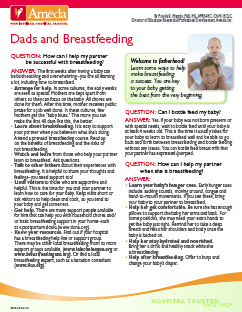Dad’s Role With Breastfeeding
You might have questions about dads and breastfeeding. What should new dads expect in the first months of their newborn’s life and what can they do to help their partners? We have answers and some tips for new fathers to keep in mind as their family grows.

Tips for Dads
The first 40 days after birth can be both exciting and overwhelming! New mothers need lots of support. Here are some things new dads can do.
- Arrange for help. In some cultures, the early weeks are seen as special. Mothers are kept apart from others so they can focus on the baby. All chores are done for them. After this time, mother receives public praise for a job well done. In these cultures, few mothers get the “baby blues.” The more you can make the first 40 days like this, the better.
- Learn about breastfeeding. It is easy to support your partner when you believe in what she’s doing. Attend a prenatal breastfeeding course. Read up on the benefits of breastfeeding and the risks of not breastfeeding.
- Watch and learn from those who help your partner learn to breastfeed. Ask questions.
- Talk to other fathers. Learn about their experiences with breastfeeding. It is helpful to share your thoughts and feelings–you need support too!
- Limit visitors to those who are supportive and helpful. This is the time for you and your partner to learn how to care for your baby. Keep visits short or ask visitors to help clean and cook, so you tend to your baby and get some rest.
- Get help. There are many support people available for free or that you can hire that can help you with household chores and/or basic breastfeeding support.
- Know who to call with breastfeeding questions. Find out if your hospital has a breastfeeding help line or support group. There may be other local breastfeeding mom-to-mom support groups available, (www.lalecheleague.org or www.breastfeedingusa.org).
You can contact one of our experienced product and lactation specialists or find a local breastfeeding expert through ILCA (www.ilca.org).
Dad and Baby Bonding
If you haven’t spent much time with small babies, know that they don’t break easily. Babies love to be touched. You can get close in many ways other than feeding.
- Spend time with your baby. Put baby on your bare chest. Babies love to feel your skin against theirs. Give a massage.
- Give your baby a bath. This can be a fun time for both of you.
- Bring your baby to your partner for feedings. Yes, even during the night!
- Cuddle and walk. This can help during fussy times. Movement calms babies.
- Talk and sing to your baby. This is how babies learn to talk.
- Change your baby’s diaper. This gets easy with practice. And when your baby is breastfed exclusively, diapers don’t smell bad.
- Hold your baby to give your partner time to take a shower or eat a meal.
- Play with your baby. Moms and dads play in their own ways. This is how babies learn, and it can be fun for both of you.
New Dads and Bottle Feeding
If your baby was not born preterm or with special needs, wait to bottle feed until your baby is at least 4 weeks old. This is the time it usually takes for your baby to learn to breastfeed well and be able to go back and forth between breastfeeding and bottle feeding without any issues. You can bottle feed breast milk that your partner has expressed/pumped.
Helping Your Partner Breastfeed
Here are some of the many ways you can help your partner breastfeed:
- Learn your baby’s hunger cues. Early hunger cues include: sucking sounds, moving around, tongue and hand-to-mouth movements. If you see these, bring your baby to your partner to breastfeed.
- Help her get comfortable. Be sure she has enough pillows to support the baby, her arms and back. For some positions, she may need your extra hands to get the baby just right. Remind her to take a deep breath and relax her shoulders and body once the baby is latched on.
- Help her stay hydrated and nourished. Bring her a drink and healthy snack while she is breastfeeding.
- Help after breastfeeding. Offer to burp and change your baby’s diaper.
- Encourage her to take a nap at least once a day. Sometimes, a mother doesn’t realize how sleep deprived she is the first weeks after having a baby, and a little extra sleep can make a big difference!
- Praise her. Tell her you are proud of her and that she is a wonderful mother.
New Dads: Breastfeeding and Sex
When your baby is first born, your partner will need time for her body to recover after having a baby. Once she has had her six-week postpartum check-up, she may be physically and emotionally ready to start having sex again. It is important for you to discuss your feelings and readiness with each other. Here are some additional things to keep in mind:
- Some mothers may have less desire for sex due to fear of pain or pregnancy or just being tired.
- Many mothers have vaginal dryness due to hormonal changes while breastfeeding. Using a lubricant can make sex more enjoyable and less painful during this time.
- During sex, your partner may have an orgasm that causes the hormone, oxytocin to be released. This is the hormone that also causes milk to be released from the breasts. So, you may get a little wet! This will happen less if your partner breastfeeds before having sex.
It is important to note that your partner can get pregnant even if she is breastfeeding. Although, it is possible to use the natural child spacing method if:
- Your baby is less than six months old.
- Your partner is exclusively breastfeeding which means breastfeeding on demand, not bottle feeding or pumping.
- Your partner has not had her period yet after having her baby. But keep in mind that usually a woman’s body ovulates (releases an egg) before her period, so you may not know if you are at risk for pregnancy. The natural child spacing method does not provide 100% protection from pregnancy so it is a good idea to use a back-up form of birth control if you want to avoid pregnancy. Talk to your health care provider for more information.
Dad's Active Role
Years ago, after a baby’s birth more mothers and fathers expected to take on set roles. Most often, dad went to work and mom stayed home with baby. Breastfeeding was the mother’s job alone.
Today, many dads are more active in baby care and parenting. If your partner breastfeeds, you can still be an active parent. When mom is out and you care for baby, you can give pumped mother’s milk. In some families, dad stays home with baby while mother works outside the home. In this case, mother can breastfeed while home and pump her milk while away.
This is general information and does not replace the advice of your healthcare provider. If you have a problem you cannot solve quickly, seek help right away. Every baby is different. If in doubt, contact your physician or other healthcare provider.
Get My Insurance Covered Pump
Complete our online form and we'll take care of the rest!

